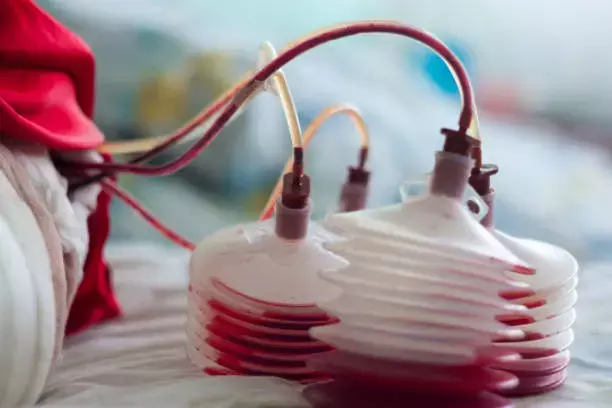- Home
- Medical news & Guidelines
- Anesthesiology
- Cardiology and CTVS
- Critical Care
- Dentistry
- Dermatology
- Diabetes and Endocrinology
- ENT
- Gastroenterology
- Medicine
- Nephrology
- Neurology
- Obstretics-Gynaecology
- Oncology
- Ophthalmology
- Orthopaedics
- Pediatrics-Neonatology
- Psychiatry
- Pulmonology
- Radiology
- Surgery
- Urology
- Laboratory Medicine
- Diet
- Nursing
- Paramedical
- Physiotherapy
- Health news
- Fact Check
- Bone Health Fact Check
- Brain Health Fact Check
- Cancer Related Fact Check
- Child Care Fact Check
- Dental and oral health fact check
- Diabetes and metabolic health fact check
- Diet and Nutrition Fact Check
- Eye and ENT Care Fact Check
- Fitness fact check
- Gut health fact check
- Heart health fact check
- Kidney health fact check
- Medical education fact check
- Men's health fact check
- Respiratory fact check
- Skin and hair care fact check
- Vaccine and Immunization fact check
- Women's health fact check
- AYUSH
- State News
- Andaman and Nicobar Islands
- Andhra Pradesh
- Arunachal Pradesh
- Assam
- Bihar
- Chandigarh
- Chattisgarh
- Dadra and Nagar Haveli
- Daman and Diu
- Delhi
- Goa
- Gujarat
- Haryana
- Himachal Pradesh
- Jammu & Kashmir
- Jharkhand
- Karnataka
- Kerala
- Ladakh
- Lakshadweep
- Madhya Pradesh
- Maharashtra
- Manipur
- Meghalaya
- Mizoram
- Nagaland
- Odisha
- Puducherry
- Punjab
- Rajasthan
- Sikkim
- Tamil Nadu
- Telangana
- Tripura
- Uttar Pradesh
- Uttrakhand
- West Bengal
- Medical Education
- Industry
Use of suction drains in primary TKA associated with increased blood loss, transfusion requirements

The use of suction drains in total knee arthroplasty (TKA) remains controversial. Anas Albasha et al conducted a study to compare the outcomes of patients who received suction drains versus those who did not, focusing on blood loss, blood transfusion need, and length of hospital stay. The study was conducted at Hamad Medical Corporation, Doha, Qatar and has been published in ‘International Orthopaedics’.
A retrospective observational cohort study was conducted at a tertiary hospital and included 262 patients who underwent unilateral non-traumatic primary TKA and were over 18 years old. Exclusion criteria entailed patients with coagulopathy, traumatic total knee replacements, inflammatory arthritis, simultaneous bilateral total knee arthroplasty, malignancy, and revision TKA. Data collected included age, sex, surgery date, use of TXA, blood transfusion status (intra or post-operative), post-operative haemoglobin level, number of dressings done until the last follow-up, range of motion, and the rate of complications such as deep vein thrombosis and pulmonary embolism.
Key findings of the study were:
• A total of 262 patients were included, with an age range of 47 to 91 years.
• Most of the included patients were females, 74.4% (195).
• Hypertension was the most frequent risk factor, 67.6%, followed by diabetes.
• Of 262 patients, 156 (59.5%) received a drain. The drain group had significantly longer hospital stay (10.7+-4.7 vs 5.4+-4.6 days, P=0.000), 30% longer tourniquet time, greater haemoglobin and haematocrit drops, higher count of transfused packed RBC units, and lower use of anticoagulants.
• Moreover, tranexamic acid (TXA) use (n=106) in surgery reduced hospital stays, tourniquet time, drain output, and increased pre- and postoperative haemoglobin and hematocrit levels compared to no TXA group (n=156) (p< 0.05, z-score reported).
The authors commented - “This study demonstrated that the use of suction drains in primary TKA was associated with longer hospital stays, increased blood loss, and higher transfusion requirements. Moreover, the use of TXA during surgery was found to be associated with better outcomes, including shorter hospital stays, decreased blood loss, improved haemoglobin and haematocrit levels, and less overall postoperative complications. However, the routine use of TXA in knee arthroplasty remains controversial and this finding should be applied in context due to potential confounders, including various patient’s and surgical factors. Further research may be needed to determine the optimal approach to managing blood loss in TKA.”
Level of Evidence: III
Further reading:
Outcomes of drain versus no drain in total knee arthroplasty: a retrospective cohort study Anas Albasha, Loay A. Salman et al International Orthopaedics (2023) 47:2985–2989 https://doi.org/10.1007/s00264-023-05946-z
MBBS, Dip. Ortho, DNB ortho, MNAMS
Dr Supreeth D R (MBBS, Dip. Ortho, DNB ortho, MNAMS) is a practicing orthopedician with interest in medical research and publishing articles. He completed MBBS from mysore medical college, dip ortho from Trivandrum medical college and sec. DNB from Manipal Hospital, Bengaluru. He has expirence of 7years in the field of orthopedics. He has presented scientific papers & posters in various state, national and international conferences. His interest in writing articles lead the way to join medical dialogues. He can be contacted at editorial@medicaldialogues.in.
Dr Kamal Kant Kohli-MBBS, DTCD- a chest specialist with more than 30 years of practice and a flair for writing clinical articles, Dr Kamal Kant Kohli joined Medical Dialogues as a Chief Editor of Medical News. Besides writing articles, as an editor, he proofreads and verifies all the medical content published on Medical Dialogues including those coming from journals, studies,medical conferences,guidelines etc. Email: drkohli@medicaldialogues.in. Contact no. 011-43720751


